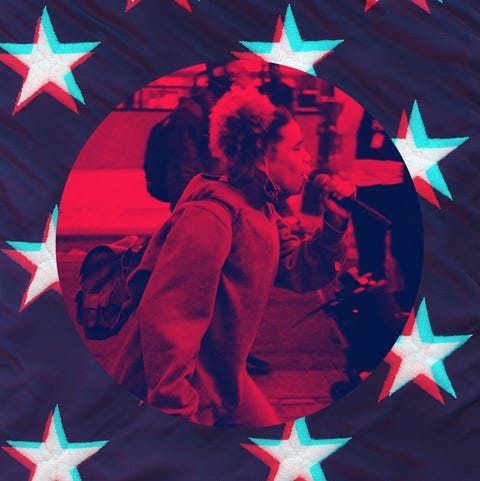
It was my first protest.
“What’s his name?” a short, fiery, red-haired teenage girl in an oversized blue
sweatshirt screamed into a mic on Yamhill Street, across from Pioneer Courthouse Square, a public plaza in downtown Portland, where they had gathered before dispersing.
The crowd, of young Black, white, Hispanic, Asian people, shouted back: “Patrick Kimmons!” Most held signs that read WHITE SUPREMACY IS TERRORISM, BLACK LIVES MATTER, or SAY THEIR NAMES. Some walked with a closed, tight fist pumped in the air. Two women signed everything for the hearing impaired.
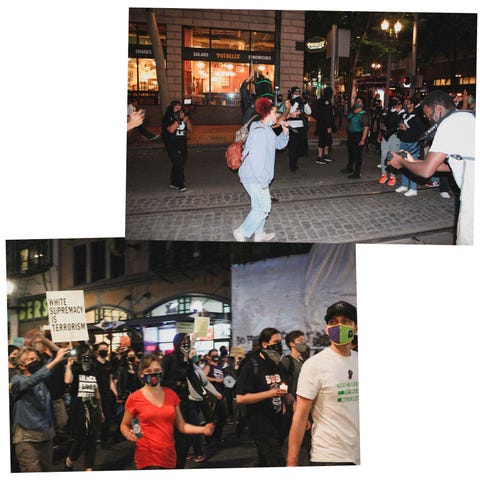
A drumline in the middle of the march dropped beat after beat as the group chorused, “B! I got your B, I got your B. L! I got your L, I got your L. M! I got your M, I got your M.”
“What does that spell?” the fiery teen asked over the mic.
“Black Lives Matter!”
“What does that spell?”
“Black Lives Matter!"
They were making their way to the parking lot on 3rd and Harvey Milk where Kimmons, a 27-year-old Black man, was killed by two white police officers two years ago, on September 30, 2018. He was shot nine times in the back.
“What’s his name?!”
“Patrick Kimmons!”
“I. Can’t. Hear. You!”
With every syllable, the fiery teen swiveled her neck. Left. Right. Repeat.
“Patrick Kimmons!”
This 16-year-old was out there, leading a crowd of at least 1,500 people. She owned every chant. Every step. Every dance move. Just everything.
When we got to the parking lot where Kimmons was shot, the drumline began again. They dropped a beat that just made you want to move. Someone took to the megaphone and starts another call and response: “This is not a riot!”
“It’s a revolution!” the crowd responded. They all knew it.
“This is NOT a RIOT!”
“It’s a REVOLUTION!”
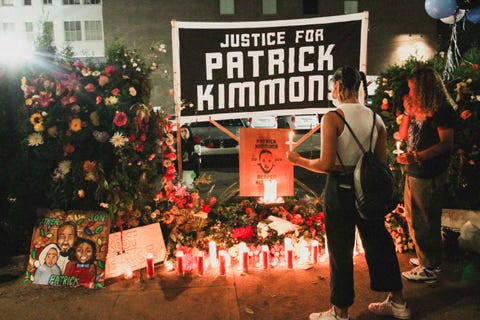
Just a few hours ago, I was in Seattle, boarding Delta flight 3516. The moment I entered my room at the Courtyard, in Portland’s City Center, around 5 p.m., I plopped down so hard on that bed. I stretched everywhere. I unwound to Pandora’s Chillwave Radio—that stuff really works, I’m telling you—considering a power nap before whatever I was about to get into. I was always on E lately. Most days, a sugar rush from Twizzlers or a Snickers bar was all I needed, but today I just felt done.
I took to Instagram like the city-stalker I had become, yawning and rubbing my eyes. “Feels Like Summer” by Childish Gambino played over my phone and I could have legit slept for days. My blinks got heavier. Did I really have it in me to go anywhere that night? But I only had one full day in Portland, so I looked through all sorts of hashtags and on different accounts, and after a few minutes in I saw news of the Kimmons protest.
The meetup spot, Pioneer Courthouse Square, was walking distance from the hotel. The walking-distance rule became a thing for me on days like this. After spending, sometimes, eight hours stuck in a car (I had never appreciated gas-station restrooms like I did now), there was nothing like not driving.
That night with the protesters, I realized it was my first time at any protest. In my life. It was a lot. I heard impromptu rap sessions, saw their revolution dance, and felt their feels. Laila, the fiery 16-year-old activist and leader of the PDX Black Youth MVMT group, took to the center of the memorial with candles lit, shining brighter as the night got darker. She began telling us her truth, and I heard the fear and pain in every word.
“If you don’t think about Black and brown children every morning when you wake up, you are doing the bare fucking minimum,” she said. The mic in her right hand, her left punctuated every word. “If you are not constantly thinking, how can I help her, how can I create opportunities for these children? You are doing the bare fucking minimum! And people like you disgust me.” The crowd bellowed its loudest. Laila was feeling this so hard. With every scream and crack in her voice, I felt it too.
There’s infectious enthusiasm when having a front-row seat to such a display. It’s one thing to see how protests are covered in the news, some reports skewing reality and others choosing only to show heated confrontations. Witnessing this revolution brought me close to optimism and hope. What was most gratifying was seeing the number of young people—Gen Z-ers, I guess they were—remarkably conscious in this moment of reckoning. It was also pleasing to see more whites in some pockets of the march than any other groups. Except for one moment when some drunk crashers came through the demonstration yelling obscenities, it was mostly peaceful.
“I wake up every day and I work my ass off because it makes every racist in that building feel horrible that a Black woman is succeeding. They hate to see me strive. I’m here because he can’t be here right now.” She turned and pointed at the Patrick Kimmons flag and the newly installed memorial, and said, “I’m doing this for him! Fuck everything else. This Black Lives Matter movement isn’t about me. It’s about Patrick Kimmons. It’s about all the lives we’ve lost. It’s about all the babies. It’s about the mothers. It’s about the fathers.”
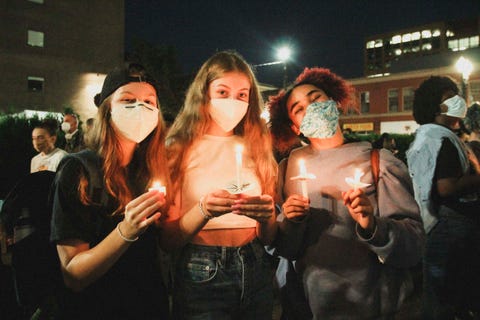
The crowd hung on this teenager’s every word. I did too.
I was thinking there, in the parking lot where Kimmons was shot down, in a city I’d never been in, when I was that young, did I walk the streets of New York this afraid of death? I think my earliest and maybe most explicit memory of an unjust death was Amadou Diallo, the African immigrant shot 41 times by the NYPD in 1999—four years after my brothers and I immigrated here from Nigeria. I wasn’t as conscious as Laila is right now of the threat of this skin.
“Get rid of this nasty system that is tearing Black individuals down,” she was saying, louder each time into the mic. ”I fear going outside. I fear leaving my dad’s side. Because me as a light-skinned woman could protect him. I fear that he’ll get pulled over and a cop will shoot him fucking dead. I’m tired of being scared. So I come out here every fucking chance that I get. I am not doing the bare minimum am I?”
No! The crowd shouted.
“I’m tired of walking in their white spaces.”
And now she sounded tired, too.
It hit me: On these travels, until this very moment, I had been documenting non-stop while suppressing every feeling of my own. But this right here triggered me. Portland was my seventeenth stop. I had heard stories of injustice. I had seen fear, and anger, and defeat. From all sides of America, all with different views. And now I needed to breathe.
Rita, what’s up? What are you feeling?
And, all I could wonder was, how many unnamed Black men and women don’t I know about? How is this really America? The same country my brothers and I were in awe of back in Nigeria. Watching Coming to America in Benin City and thinking, Man, America will be so perfect. And here I was, 25 years later, not feeling like this country was ever meant for us. And by us, I mean anyone with this Black skin.
The protest swirled around me like a fever. I felt weak in my body, in my head. I was standing by a light pole. Over my head was a giant speaker blaring message after message, some of them from shaky voices. All I could do was lean my head back on the pole and close my eyes for a moment as Kimmons’s mom, Letha Winston, spoke. Crying at times. Remembering her son.
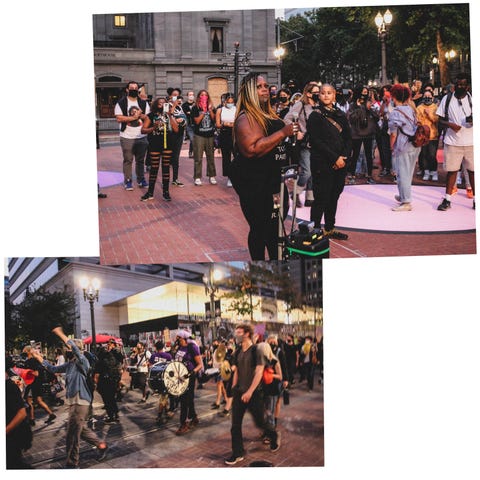
“They talk so bad about my baby. But they didn’t tell y’all about the good part about Pat-Pat,” she said. Patrick went to Portland Community College and was raised in a respectful home. Growing up in her family ain’t no joke. If she told you to get up, you got up. “My son was a good man. He took care of his kids. He took care of his baby’s mama. He checked on his mama. He knew what exactly when to do it and how to do it.”
Since her son’s death, she’s learned to keep “ten toes to the pavement.” Marching and protesting for Pat-Pat until she gets some justice.
As I leaned on the light pole, listening to her, excusing myself, just for a moment, of my documenter duties, I was full-on in my feels. All I thought about was all those years ago when one of my brothers was stopped and arrested in Plattsburgh, New York. At the time, he was only a Green Card holder. The charge went from a slap on the wrist, six-month probation recommendation (I got the FOIA records later on) in one breath to twelve serious charges in another. He was put in jail and, two years later, deported. And my family is still picking up the pieces to this day.
Just then, though, I felt thankful.
I thanked God that that was all it was. Right? He’s alive. He’s not another Black man gone too soon. There was no eulogy. I guess that’s the bar now: “Oh, he made it out alive from that traffic stop. Thank God!” I was embarrassed to even feel that. Because I was going through my healing too. Unpacking a recent encounter with an officer. Just a day before my trip down here, I was pulled over by a white cop as I entered Washington. He falsely ticketed an infraction and I still can’t decompress from my anger and anxiety over that.
I stood next to the sound guy who would later tell me the name of the 30-year-old charismatic protest organizer and leader I kept trying to get ahold of all night. This guy was legit. It seemed he was everywhere all at once. I’d look up from my phone, and he’d gone from just being inches away from me to being on the other side of the 1,500 people. We’d end up connecting the next morning at Pioneer Square, where he told me, in the simplest of ways, that this country would see real equity for all “when the Black trans woman is free.”
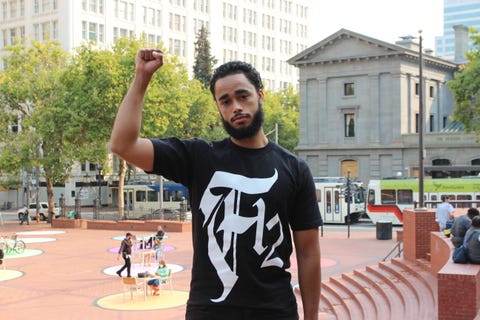
That night, after the protest, my Fitbit logged 18,936 steps, about nine miles. It was as painful as it sounds. “White Lies,” by ODESZA, on Chillwave, hummed me to sleep.
All emotions vacated, my breaths slower, I begged the racing thoughts to settle. Listen to the music instead. I pressed the blanket closer, the downy bed held me into the rest I had craved. My brain, and my soul, disconnected from my body as I began to drift.

